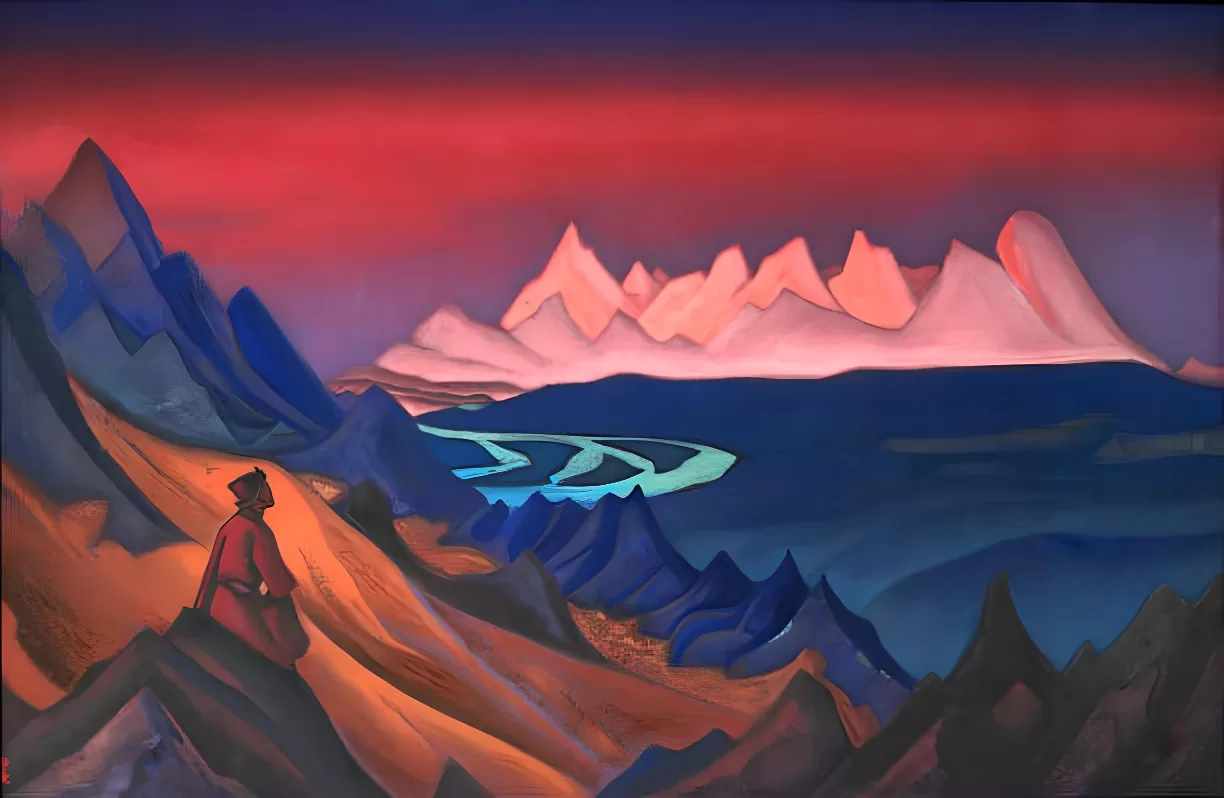A small collection of articles by the Italian Traditionalist thinker Julius Evola, Meditations on the Peaks, centred around the common theme of mountains and their conquest, was published in Italian in 1974. These works were gathered and published with Evola’s approval by his friend and scholar of his work, Renato Del Ponte. Meditations on the Peaks has had several reprints in different editions and has been translated into Spanish, French, Russian, and English.
As once noted in an interview with Russian traditionalist Geydar Dzhemal, ‘Evola engaged in metaphysical mountaineering.’ Indeed, this description is quite apt. The importance the Italian Traditionalist attributed to mountaineering and the symbolism of mountain peaks is undeniable. Evola critiques the contemporary approach (at the time of writing the articles, and this stance has only strengthened over time) to mountaineering merely as a sport. He emphasises the need for a meaningful, contemplative, spiritual, almost liturgical nature of climbing. In his essays, he highlights the mountain’s significance as a symbol in various ancient teachings and legends. These moments in the narrative are reminiscent of the first part of his book Revolt Against the Modern World. This is not surprising, as around the time he wrote this seminal work, Evola was actively practising mountaineering and writing about it in periodicals.
A special mention is due for the second part of this modest publication, where Evola ventures into the rare genre of autobiographical sketches. He shares his mountaineering experiences, producing a remarkably intriguing, vivid, and inspiring document. It seems that apart from these articles, the book The Path of Cinnabar, and a few diary entries, Evola seldom wrote about himself. Here, readers have the rare opportunity to witness the living master who, between scaling icy peaks, sips whisky, listens to jazz, and reads the Bhagavad Gita. Along with Italian and English companions, tied together by a safety rope, he climbs sheer cliffs; fortified by strong alcohol, he glides over a frozen mountain lake, naming this sensation one of the most vivid in his life.
What makes Evola intriguing, besides his known virtues? His splendid imagery and astounding knowledge in the realm of mythology are always aptly demonstrated. Even someone sceptical of the Traditionalist doctrine can glean numerous valuable insights from his writings.
Evola likens mountain peaks to the world of Tradition, and the valley, filled with worldly bustle, to the contemporary world. In the mountaineering brotherhood, Evola perceives a manifestation of the primal interaction mode of ancient Europeans, distinct from modern socialist egalitarianism and bourgeois individualism, founded on trust and mutual aid among strong and self-sacrificing individuals.
In the appendices section, there is a notable essay on Nicholas Roerich, an artist whom Evola held in high esteem. Evola kept reproductions of Roerich’s paintings at his home. Although Evola never visited Tibet, he believed Roerich’s depictions of its peaks to be the most accurate, as the great Russian painter saw them not only with his eyes but with his heart.
In our era, where nearly all of life’s facets are consumed by the fleeting and superficial, young individuals aspiring for something greater need guidance and exemplars even more than in the first half of the twentieth century. To escape the trivial hustle of the age, one must turn to inner growth. Seeking revelation on mountain peaks is one such journey. We hope Evola’s examples and teachings inspire new readers to achieve great feats, and that this modest book does not merely gather dust on shelves but finds its way into the backpacks of new elemental conquerors. The latter, however, should heed the Italian thinker’s advice for the younger generation: ensure that their passion for mountaineering does not desecrate the mountains, and that physical ascents are complemented by spiritual ones.
Towards the end of his life, confined to a wheelchair, Evola decreed that his ashes be buried in the glacier of Monte Rosa, a mountain he climbed in his youth. His soul yearned for the summits and found peace there. This is no coincidence. The mountain represents a vertical symbol, frozen between sky and earth, a place rightfully reserved for the herald in our world of lofty ideals.








‘Yearning for the summit’ – it has many meanings. Including this one: ‘Opposing [an] apparently all-powerful coalition of destructive satanic forces bring[ing] with it tests and burdens of superhuman nature, but that is not dishonourable — the opposite in fact. To bravely accept a battle that is unavoidable and inescapable, to wage it in the name of Divine Providence, to have confidence in it and its eventual blessing, to stand before fate with a pure conscience and clean hands, to bear all suffering and every test, never even thinking of being untrue to one’s historic mission, never wavering even in the most difficult hours of the final battle.’ Rising to the heights. Вечная память Julius Evola